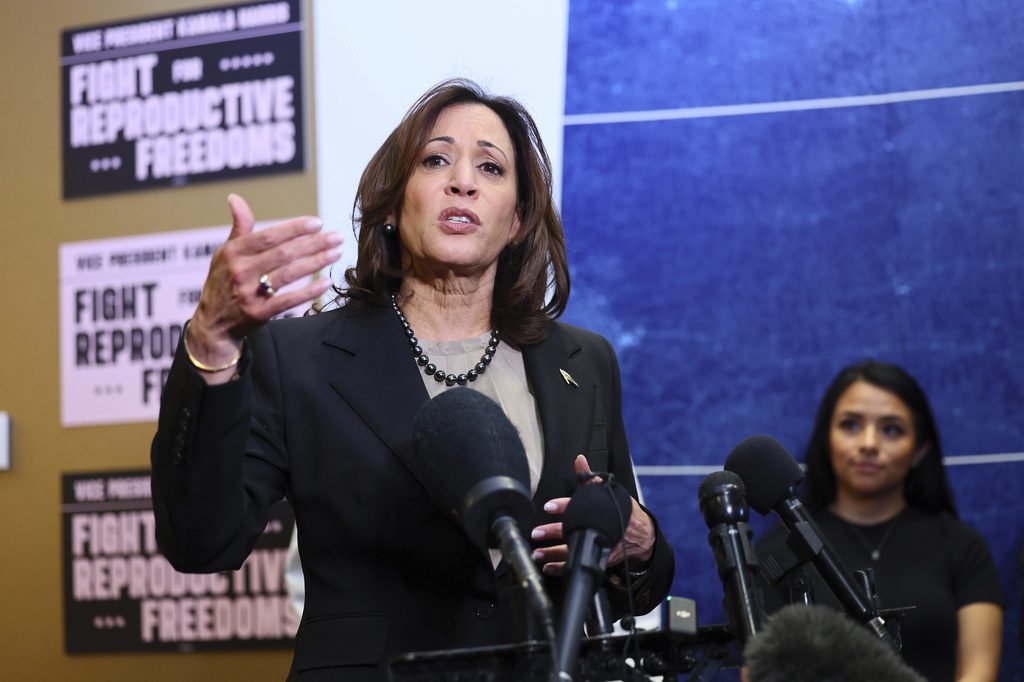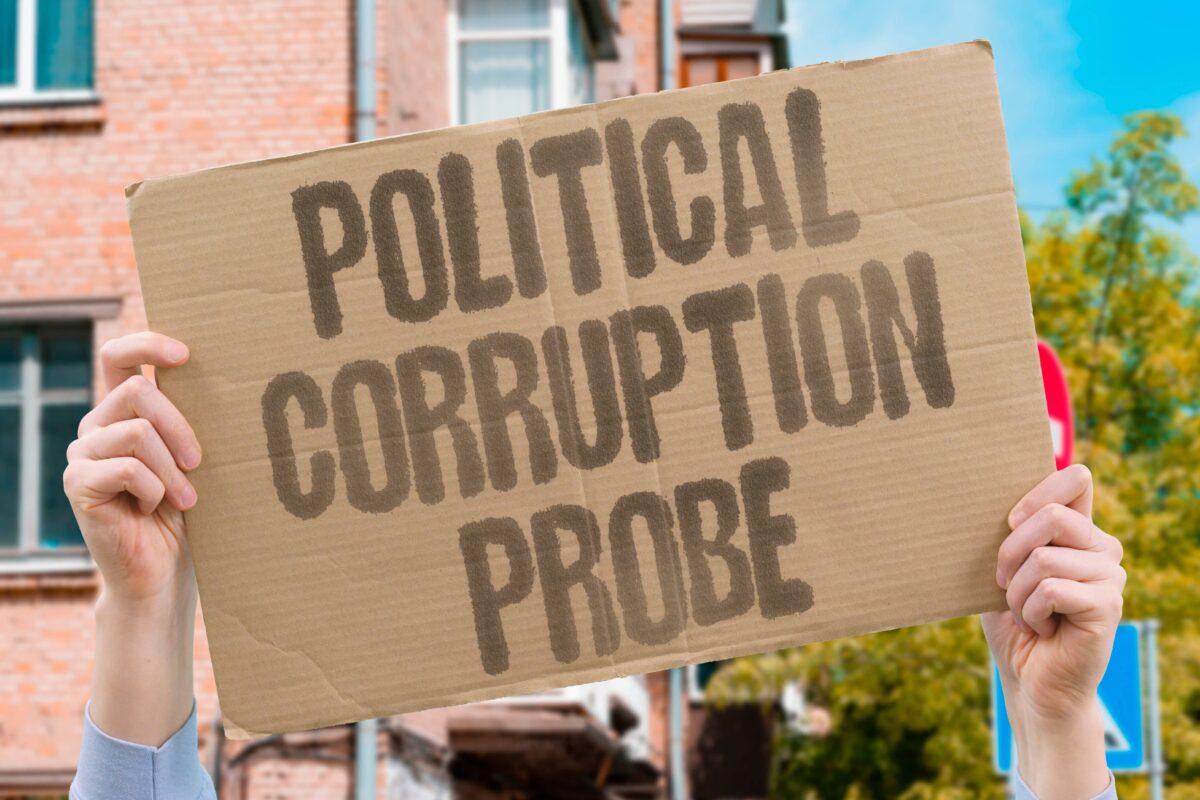
Vice President Kamala Harris speaks at Planned Parenthood, Thursday, March. 14, 2024, in St. Paul, Minn. (AP Photo/Adam Bettcher)
Harris has a longstanding history of advocating for reproductive rights, something she’s sure to highlight on the campaign trail as she seeks to paint a stark contrast between herself and former president Donald Trump.
Now that President Joe Biden has dropped out of the 2024 presidential race and endorsed Vice President Kamala Harris as the Democratic nominee, Harris’ record on the issues is getting a lot of attention.
One of those issues – and arguably one of the most critical ones in this year’s election – is reproductive freedom, and Harris has been a longtime advocate for abortion rights and reproductive health care access.
Let’s take a look.
Harris defended reproductive rights as California AG and Senator
As California’s attorney general, she co-sponsored the Reproductive FACT Act, for example, which sought to protect pregnant women from the deceptive and harmful practices of “Crisis Pregnancy Centers” (CPCs). These centers often advertise themselves as offering a full range of reproductive health care but do not offer abortion care and often exist solely to discourage patients from accessing abortion care.
And in 2016, she joined attorneys general from 13 other states in calling on the US Supreme Court to overturn a lower court ruling that significantly restricted abortion access in Texas.
“Every woman has the right to make informed choices about her health and well-being,” Harris said at the time. “I strongly urge the Supreme Court to overturn the Fifth Circuit ruling, which undermines both public health and a woman’s right to choose.”
During her time as a US senator from 2017 through 2020, Harris was even more vocal in defense of reproductive rights.
In 2017, when Senate Republicans attempted to ban abortion after 20 weeks of pregnancy—a bill backed by former president Trump—Harris voted against the bill and said it was “another example of politicians playing politics with health care.”
That same year, she also co-sponsored a bill to ban states from restricting abortion rights, and in 2018, she voted against a proposed amendment that would have prohibited federal funding for abortion services.
When the Trump administration issued a gag rule in 2019 that tried to block Planned Parenthood from getting funding via Title X—the United States’ decades-old bipartisan program for reproductive health care and affordable birth control—Harris called the rule “shameful.”
“In some rural communities, Planned Parenthood is the only place to get low-cost reproductive care — meaning people could suffer longer wait times, higher costs, and a lack of services because of Trump’s gag rule,” she said.
She also pushed back on state-level efforts to ban abortion.
In 2019, when South Carolina Republicans tried to push a 6-week abortion ban in their state, she was one of its most vocal opponents.
“It’s outrageous South Carolina Republicans are covertly fast-tracking a dangerous bill to ban abortions before most women even know they’re pregnant,” Harris said.
How Harris stepped up after the end of Roe
While Harris had been a longtime supporter of abortion rights, it was the US Supreme Court’s decision overturning Roe v. Wade in 2022 that made her arguably the Democratic Party’s strongest voice on reproductive rights.
Harris wasted no time highlighting the stakes of the court’s decision.
“Millions of women in America will go to bed tonight without access to the health care and reproductive care that they had this morning; without access to the same health care or reproductive health care that their mothers and grandmothers had for 50 years,” Harris said during an Illinois appearance the same day Roe was overturned.
Harris spent the rest of 2022 advocating for reproductive rights, and alongside President Biden, calling for the restoration of Roe under federal law.
In fact, in the months after Roe was overturned, the vice president “held more than 50 convenings in at least 16 states while bringing together hundreds of state legislators, state attorneys general, health care providers, faith leaders, students, and advocates who are on the frontlines of the fight for reproductive rights,” according to the White House.
In Dec. 2023, Harris announced her “Fight For Reproductive Freedoms” tour, which kicked off on Jan. 22—the 51st anniversary of Roe v. Wade. This tour has seen the vice president address reproductive freedom and highlight the impacts of Republican-backed abortion bans across battleground states, including Arizona, Florida, and Nevada.
At a joint campaign event in January, Harris and Biden reiterated their promise to restore Roe should Democrats win the presidency in November, if voters also elect a Democratic-controlled House of Representatives and a Democratic majority that’s willing to eliminate the filibuster in the Senate.
Harris also made history earlier this year when she became the first vice president to visit an abortion clinic—she toured a Planned Parenthood facility in Minnesota.
During her tour appearances, Harris has repeatedly highlighted the stakes of a potential second Trump term.
“Donald Trump handpicked three members of the United States Supreme Court because he intended for them to overturn Roe. And as he intended, they did,” she told a crowd during an appearance in Florida in May. “Here’s what a second Trump term looks like: more bans, more suffering, less freedom.”
On the second anniversary of Roe’s reversal, in June, Harris further hammered home how Trump took away the reproductive rights of tens of millions of American women.
“In the case of the stealing of reproductive freedom from the women of America, Donald Trump is guilty,” she said.
As for how she’ll campaign against Trump as she seeks the presidency, it’s likely Harris will continue to paint a stark contrast between herself and him on reproductive rights.
She’s already taken this approach in a statement issued just one day before Biden dropped out of the race.
“Let’s be clear: Donald Trump would sign a national abortion ban and restrict access to contraception if given the chance,” she said on X. “That is what’s at stake in November. We will stop him.”













